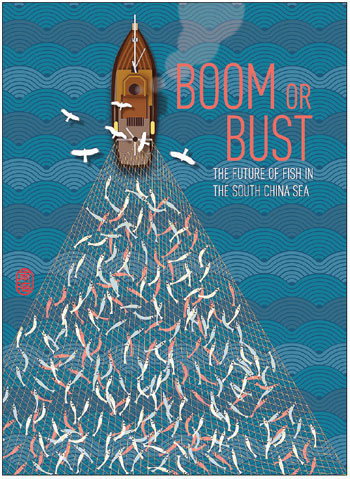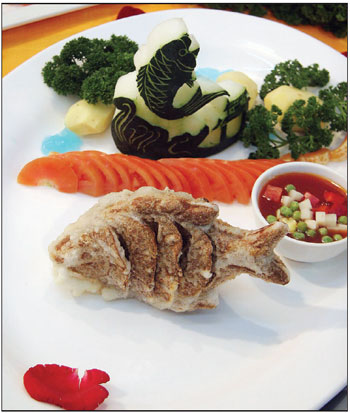Seafood for tomorrow
Updated: 2015-11-06 08:07
By Mike Peters(China Daily)
|
||||||||
A new report on overfishing of popular seafood species in Asia has spurred Hong Kong eateries to serve up more sustainable fare, Mike Peters reports.
About 25 Hong Kong restaurants and hotels have joined a campaign to promote the sustainable consumption of seafood, a monthlong program that was launched on Tuesday with the release of a new study indicating that some marine resources in the South China Sea have been overfished to as low as 5 percent of their 1950s levels, while demand continues to rise.
Participating eateries and caterers will provide at least one certified-sustainable seafood dish on their menus until the end of November. Caterers for schools, corporations and universities are hosting programs to educate the local community about the state of marine ecosystems in the South China Sea. Restaurants, hotels and organizations taking part in the festival include Four Seasons Hotel Hong Kong, Grand Hyatt Hong Kong, Cafe Gray, Sohofama, Cafe Deco, Ocean Park, the University of Hong Kong and the Hong Kong Jockey Club.
The Napoleon wrasse and the coral grouper, two reef fish highly prized in Hong Kong, have declined from relative abundance to about 20 percent of their populations just eight years ago.

"The most vulnerable groups include grouper, large sharks, threadfin bream and large croaker, which are projected to drop by 50 percent or more during this period," says the University of British Columbia's William Cheung, a co-author of the report.
In the study Boom or Bust, The Future of Fish in the South China Sea, researchers from the Canadian university found that other seafood resources have been reduced to just 10 percent of their populations since the mid-1990s. "Even in more remote fishing locations, catch rates have declined three to four times over the past two decades," according to the study, which offers a pathway to a more sustainable future.
Asia's oceans are home to some of the richest and most diverse fisheries in the world but our marine resources are severely threatened by pollution and destructive fishing practices, the report says. While pollution and water quality is partly responsible, overfishing is the main culprit, and fishing methods play a key role in impacts on the environment.
"The study shows that to rebuild biomass of key groups to a healthy level, fishing efforts of all fishing fleets have to be substantially reduced," says UBC's Rashid Sumaila, principal investigator for the project.
"If nothing is done, by 2045, relative to 2015 fish stocks, all species studied will experience a decrease in biomass (quantity of fish in the ocean) ranging from 9 to 59 percent as a result of overfishing, ocean warming, ocean acidification and changes in primary productivity," adds Cheung. "We must urgently improve fisheries management and consider our impact on the ocean via CO2 emissions."
In the meantime, the festival aims to raise public awareness about the challenges we face and encourage people to consume differently.
"Our aim is to build public knowledge of sustainable seafood, why we should care about what we are eating, and where it comes from", says Doug Woodring, co-founder of Ocean Recovery Alliance, one of the event organizers.
A key intended result, he says, is to help restaurateurs' get better access to more sustainable seafood, by increasing availability and visibility in the marketplace.
Sponsored by The Ocean Recovery Alliance and the ADM Capital Foundation, the initiative is a collaboration with the Marine Stewardship Council and the Aquaculture Stewardship Council, which are the primary organizations setting standards for sustainable seafood globally.
Contact the writer at michaelpeters@chinadaily.com.cn

|
Hong Kong restaurants and hotels have joined a monthlong campaign to promote the sustainable consumption of seafood. Photos Provided To China Daily |
(China Daily USA 11/06/2015 page15)
- Thwarted homecoming of soldiers' remains triggers emotional breakdown
- China's first innovative drug approved NDA in the US
- China lists, names five for judicial intervention
- Scientists decode panda language
- Beijing embraces first snow of the season
- New policy expected to bring spike in births, and then fewer

 History of Coca-Cola on display in Shanghai
History of Coca-Cola on display in Shanghai
 Beijing embraces first snow of the season
Beijing embraces first snow of the season
 10 reasons why Chinese tourists like Singapore
10 reasons why Chinese tourists like Singapore
 Negotiation is 'right approach'
Negotiation is 'right approach'
 Top 10 Asian economies with highest English proficiency
Top 10 Asian economies with highest English proficiency
 PLA Navy fleet pays visit to Florida
PLA Navy fleet pays visit to Florida
 Top Gun: Breathtaking moments of China Air Force
Top Gun: Breathtaking moments of China Air Force
 Peace Ark docks at San Diego
Peace Ark docks at San Diego
Most Viewed
Editor's Picks

|

|

|

|

|

|
Today's Top News
China, not Canada, is top US trade partner
Tu first Chinese to win Nobel Prize in Medicine
Huntsman says Sino-US relationship needs common goals
Xi pledges $2 billion to help developing countries
Young people from US look forward to Xi's state visit: Survey
US to accept more refugees than planned
Li calls on State-owned firms to tap more global markets
Apple's iOS App Store suffers first major attack
US Weekly

|

|








